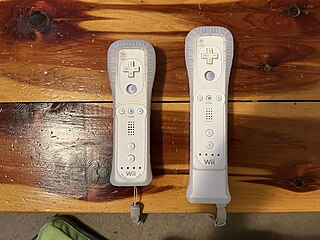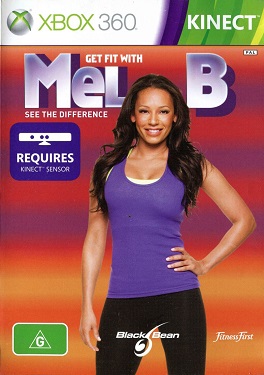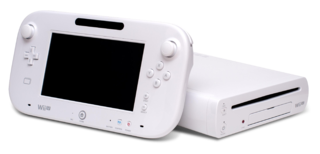
The Wii is a home video game console developed and marketed by Nintendo. It was released on November 19, 2006 in North America, and in December 2006 for most other regions of the world. It is Nintendo's fifth major home game console, following the GameCube and is a seventh-generation console alongside Microsoft's Xbox 360 and Sony's PlayStation 3.

Cars is a 2006 adventure racing game published by THQ. The game is based on the 2006 film of the same name. It was released for the PlayStation 2, GameCube, Xbox, Microsoft Windows, Game Boy Advance, Nintendo DS, and PlayStation Portable in June 2006, with versions for the Xbox 360 and Wii released later that year. The Wii version includes functionality geared towards its Wii Remote controller and was a launch game for the system. Taking place after the events of the film, the game follows Lightning McQueen as he participates in the new racing season with his goal set on finally winning the Piston Cup. While doing so, he races and trains with the local community of Radiator Springs.

Humongous Entertainment, Inc. was an American video game developer based in Bothell, Washington. Founded in 1992, the company is best known for developing multiple edutainment franchises, most prominently Putt-Putt, Freddi Fish, Pajama Sam and Spy Fox, which, combined, sold over 15 million copies and earned more than 400 awards of excellence.

Wii Play is a party video game developed and published by Nintendo for the Wii console. It was released as a launch game for the console in Japan, Europe, and Australia in December 2006, and was released in North America in February 2007. The game features nine minigames, including a Duck Hunt-esque shooting range, a fishing game, and a billiards game, each of which are designed to showcase the features of the Wii Remote controller.

The Sixaxis is a wireless gamepad produced by Sony for their PlayStation 3 video game console. It was introduced alongside the PlayStation 3 in 2006 and remained the console's official controller until 2008. The Sixaxis was succeeded by the DualShock 3, an updated version of the controller that, like the DualShock and DualShock 2 controllers, incorporates haptic technology – also known as force feedback. A Sixaxis controller can also be used with PSP Go and the PlayStation TV via Bluetooth after registering the controller on a PlayStation 3 console.

Vanpool, Inc. was an independent Japanese video game, music software, computer software and toy developer. Its employees included Taro Kudou and Kazuyuki Kurashima, both of whom worked for the independent game developer Love-de-Lic. The company shut down on May 31, 2023.
The seventh generation of home video game consoles began on November 22, 2005, with the release of Microsoft's Xbox 360 home console. This was followed by the release of Sony's PlayStation 3 on November 17, 2006, and Nintendo's Wii on November 19, 2006. Each new console introduced new technologies. The Xbox 360 offered games rendered natively at high-definition video (HD) resolutions, the PlayStation 3 offered HD movie playback via a built-in 3D Blu-ray Disc player, and the Wii focused on integrating controllers with movement sensors as well as joysticks. Some Wii controllers could be moved about to control in-game actions, which enabled players to simulate real-world actions through movement during gameplay. By this generation, video game consoles had become an important part of the global IT infrastructure; it is estimated that video game consoles represented 25% of the world's general-purpose computational power in 2007.

The Vii is a Shanzhai video game console similar in design to Nintendo's Wii. It was originally released in China in 2007. The Vii was not intended to be a seventh-generation console like the Wii, and was instead part of the dedicated console genre of inexpensive consoles with built-in games.

In computing, a motion controller is a type of input device that uses accelerometers, gyroscopes, cameras, or other sensors to track motion.

The Wii MotionPlus (Wiiモーションプラス) is an expansion device for the Wii Remote, the primary game controller for the Wii. The device allows more complex motion to be interpreted than the Wii Remote can do alone. Both the Wii and its successor, the Wii U, support the Wii MotionPlus accessory in games.

PlayStation Move is a motion game controller developed by Sony Interactive Entertainment. Initially released in 2010 for use with the PlayStation 3 home video game console, its compatibility was later expanded to its successor, the PlayStation 4 in 2013, its PlayStation VR platform in 2016 and the PlayStation 5 in 2020. Conceptually similar to Nintendo's Wii Remote and Microsoft's Kinect, its function is based around controller input in games stemming from the actual physical movement of the player. The Move uses inertial sensors in the wand to detect motion while the wand's position is tracked using a PlayStation Eye or PlayStation Camera. The device was generally well received by critics, but has not quite met Sony's goals for integration into the market.
Since the release of the Nintendo Wii, many aesthetic, ergonomic and functional accessories have been developed by third parties for the console’s controller, the Wii Remote.

Wii is a series of simulation games published by Nintendo for the game console of the same name, as well as its successor, the Wii U. After a seven-year hiatus, the game Nintendo Switch Sports, described officially as "a new iteration of the Wii Sports series," was announced, the first game to drop the "Wii" from its title. These games feature a common design theme, with recurring elements including casual-oriented gameplay, casts consisting mostly or entirely of Miis, and control schemes that simulate real-life activities.

Get Fit with Mel B is a fitness video game developed by Lightning Fish and released for all three major seventh-generation consoles: the PlayStation 3, Wii and Xbox 360, utilizing each console's advanced motion control accessory for fitness gameplay.

No More Heroes is an action-adventure hack and slash video game developed by Grasshopper Manufacture for the Wii. It was released by Marvelous Entertainment in Japan in 2007, Ubisoft in North America and Rising Star Games in PAL territories in 2008. The game was directed, designed, and written by Goichi Suda, also known by his nickname Suda51. The game follows Travis Touchdown, an otaku who wins a beam katana in an auction, from which he inadvertently becomes involved in the United Assassins Association and forced to kill assassins higher in rank to prevent other assassins from targeting him.

Wii Play: Motion is a video game for the Wii console and the sequel to the 2006 game Wii Play. It was released in North America on June 13, 2011; Europe on June 24; Australia on June 30; and Japan on July 7, 2011.

The Wii U is a home video game console developed by Nintendo as the successor to the Wii. Released in late 2012, it is the first eighth-generation video game console and competed with Microsoft's Xbox One and Sony's PlayStation 4.
The eighth generation of video game consoles began in 2012, and consists of four home video game consoles: the Wii U released in 2012, the PlayStation 4 family in 2013, the Xbox One family in 2013, and the Nintendo Switch family in 2017.














